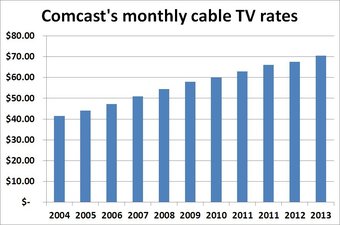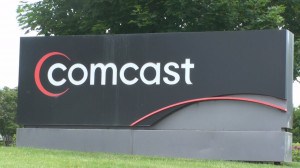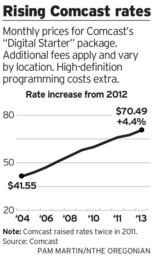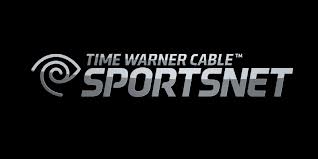
Steve Burke is CEO of NBCUniversal and an executive vice president at Comcast.
Comcast is in the enviable position of negotiating with itself for permission to carry Comcast-owned NBC stations over Comcast Cable, earning the company hundreds of millions in retransmission consent fees paid by cable subscribers.
Comcast executive vice president Steve Burke, who also oversees the Comcast-owned NBCUniversal, said retransmission fees are changing the broadcast business, and makes Comcast a ton of money along the way.
“NBC made virtually nothing on retransmission consent two years ago,” Burke told investors at the Bank of America Merrill Lynch 2013 Media, Communications & Entertainment Conference. “This year we’ll make about $200 million.”
Since acquiring NBCUniversal, cable subscribers cannot help but find themselves watching at least one channel owned by the entertainment and cable conglomerate. Burke said in addition to owning NBC local stations in the largest U.S. cities, Comcast also owns or controls an impressive number of popular cable channels including USA, Syfy, Bravo, E!, MSNBC, CNBC, The Weather Channel, and a variety of sports networks. Seven Comcast-owned cable networks earn the company more than $200 million annually, providing almost two-thirds of the programming division’s operating cash flow.
But Burke isn’t satisfied with those earnings, claiming cable companies undervalue the networks’ true worth by 20-25 percent.
 “There is a monetization gap between how those channels are doing and how they should be doing measured by how peer cable channels are doing,” Burke explained. “In other words we are not paid as much as we think we should be given our ratings and our positioning by cable and satellite companies.”
“There is a monetization gap between how those channels are doing and how they should be doing measured by how peer cable channels are doing,” Burke explained. “In other words we are not paid as much as we think we should be given our ratings and our positioning by cable and satellite companies.”
Burke told investors the company is positioning to capitalize on the growth of retransmission consent fees that will deliver more revenue to the broadcast and cable programming divisions of Comcast that will be eventually reflected on subscribers’ bills.
“The key to retransmission consent is to have contracts expire with the big distributors that allow you to reopen the existing retransmission consent contracts,” Burke said. “One thing that we really hadn’t figured on when we did the deal was how rapidly retransmission consent was going to establish itself. We underestimated that frankly. That’s a very good thing for NBCUniversal, but not so good I think for Comcast Cable.”
Although Comcast has been very vocal about unreasonable price increases for broadcast and cable television programming owned by other companies, it expects comparable compensation for its own stations and networks.
“As our contracts come up, we will get those revenues the same way CBS, ABC and FOX have,” Burke argues. “I see no reason why we won’t […] get paid in a similar fashion to the way that they get paid in the future.”


 Subscribe
Subscribe Comcast rates are going up again this fall in the Pacific Northwest, now exceeding $70 a month.
Comcast rates are going up again this fall in the Pacific Northwest, now exceeding $70 a month.
 Time Warner Cable’s decision to spend $11 billion to broadcast Los Angeles Lakers and Dodgers games at an estimated cost of $50-60 a year per subscriber is the subject of a
Time Warner Cable’s decision to spend $11 billion to broadcast Los Angeles Lakers and Dodgers games at an estimated cost of $50-60 a year per subscriber is the subject of a  Cable companies, including Time Warner Cable, are offering a mix of threats and financial incentives to keep popular cable programming away from online video competitors.
Cable companies, including Time Warner Cable, are offering a mix of threats and financial incentives to keep popular cable programming away from online video competitors.
 In response to the deadly tornadoes in Moore, Okla., Cox Communications today said it would lift viewing restrictions for dozens of networks for Cox Cable customers who want to watch cable programming online using Wi-Fi or mobile broadband.
In response to the deadly tornadoes in Moore, Okla., Cox Communications today said it would lift viewing restrictions for dozens of networks for Cox Cable customers who want to watch cable programming online using Wi-Fi or mobile broadband.